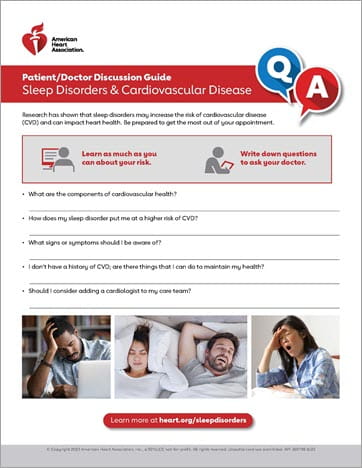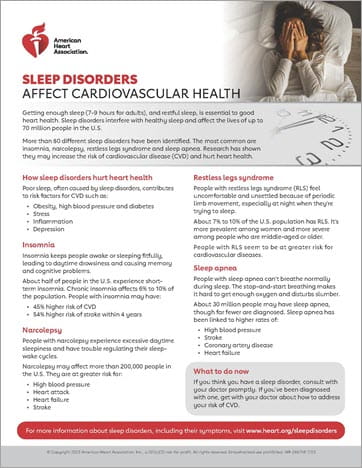Insomnia and Heart Health

What is insomnia?
Insomnia is one of the most common sleep disorders. It affects your ability to fall asleep, stay asleep or get good sleep. People with insomnia can experience excessive daytime sleepiness as a result of sleep challenges, which can make it difficult to function throughout the day. Insomnia can also affect memory and cognitive skills. Short-term insomnia can be caused by stress or life changes. Chronic insomnia is when you experience insomnia at least three nights a week, for at least three months.
What are the symptoms of insomnia?
The symptoms of insomnia are:
- Difficulty falling asleep.
- Difficulty maintaining sleep.
- Difficulty getting quality sleep.
- Daytime sleepiness and low energy.
- Challenges with concentration, focus and memory.
- Higher risk of depression, anxiety and irritability.
How many people are affected by insomnia?
As many as 1 in 2 adults will experience short-term insomnia. Chronic insomnia affects roughly 6-10% of the population.
How is insomnia diagnosed and treated?
If you feel like insufficient sleep is affecting your ability to function on a regular basis, talk to your doctor. Your doctor will ask you a series of questions about your sleep habits and may ask you to track your sleep in a sleep diary.
They will also consider other health issues that could affect your sleep. If you have trouble falling asleep and staying asleep at least three days a week, for at least three months, you may be diagnosed with chronic insomnia.
Talk to your doctor about treatment options for insomnia. The primary treatment options include building better sleep habits and doing cognitive behavioral therapy. Some prescription medications can help address insomnia, though largely with short-term issues.
View the Patient/Doctor Discussion Guide (PDF)
How is insomnia connected to cardiovascular disease and brain health?
Research suggests that insomnia puts you at a higher risk of cardiovascular disease (CVD). While scientists are still working to understand the full connection between insomnia and cardiovascular disease, they’ve found many reasons to believe insomnia can raise the risk of cardiovascular disease. In one study, they found that patients with insomnia had a 45% higher risk of cardiovascular disease.
For example, there is evidence that insomnia increases the stress hormone cortisol and changes your body’s stress response, which can increase the risk of cardiovascular disease, along with diabetes, anxiety and depression.
Studies have also shown that shortened or disrupted sleep, like the symptoms of insomnia, can increase blood pressure and inflammation, which may raise the risk of CVD. And other research has shown a connection between short sleep and calcium buildup in the heart arteries, which can also contribute to a higher risk of cardiovascular disease.
The risk of stroke can also go up as a result of insufficient sleep. The connection between insomnia and stroke risk needs more research, but one large study found that people with insomnia had a 54% higher risk of stroke within four years.
View How Sleep Disorders Affect Cardiovascular Health Fact Sheet (PDF)








